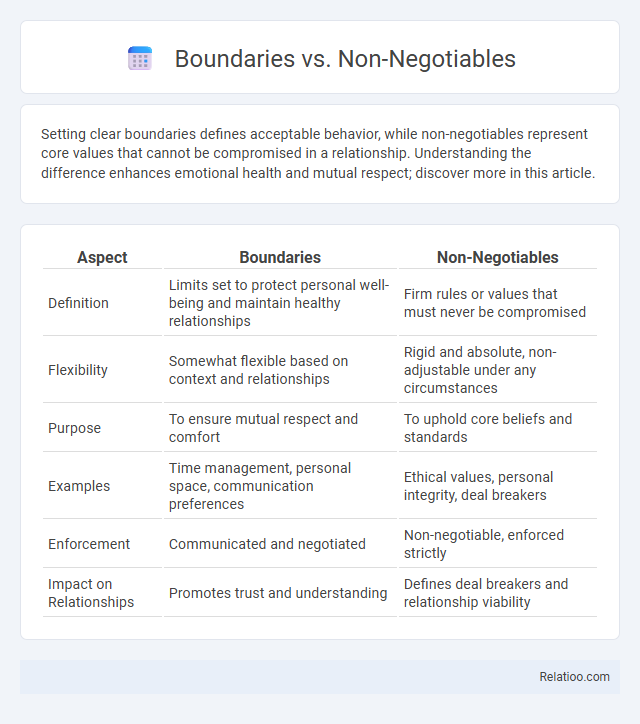Setting clear boundaries defines acceptable behavior, while non-negotiables represent core values that cannot be compromised in a relationship. Understanding the difference enhances emotional health and mutual respect; discover more in this article.
Table of Comparison
| Aspect | Boundaries | Non-Negotiables |
|---|---|---|
| Definition | Limits set to protect personal well-being and maintain healthy relationships | Firm rules or values that must never be compromised |
| Flexibility | Somewhat flexible based on context and relationships | Rigid and absolute, non-adjustable under any circumstances |
| Purpose | To ensure mutual respect and comfort | To uphold core beliefs and standards |
| Examples | Time management, personal space, communication preferences | Ethical values, personal integrity, deal breakers |
| Enforcement | Communicated and negotiated | Non-negotiable, enforced strictly |
| Impact on Relationships | Promotes trust and understanding | Defines deal breakers and relationship viability |
Understanding Boundaries and Non-Negotiables
Understanding boundaries involves recognizing the limits you set to protect your emotional and physical well-being, while non-negotiables are firm principles or values you refuse to compromise under any circumstance. Boundaries can be flexible and vary depending on context, but non-negotiables remain constant and define your core integrity and self-respect. Distinguishing between these helps you maintain healthy relationships and communicate your needs clearly.
Key Differences Between Boundaries and Non-Negotiables
Boundaries define the limits individuals set to protect their well-being and maintain healthy relationships, while non-negotiables are rigid rules or values that must not be compromised under any circumstance. Boundaries can be flexible and adjusted over time based on context and personal growth, whereas non-negotiables remain constant and are critical to one's core principles or dealbreakers. Understanding these differences helps clarify relationship expectations and personal integrity by distinguishing between adaptable preferences and steadfast commitments.
Why Boundaries Matter in Healthy Relationships
Boundaries establish personal limits that protect emotional well-being and ensure mutual respect within healthy relationships. Non-negotiables, often more rigid, represent core values or deal-breakers that individuals refuse to compromise on to maintain their integrity and happiness. Understanding the distinction between flexible boundaries and firm non-negotiables helps partners communicate effectively and build trust, fostering long-term relational health.
The Role of Non-Negotiables in Self-Respect
Non-negotiables are fundamental principles or values that you refuse to compromise, playing a crucial role in maintaining your self-respect and personal integrity. Unlike general boundaries, which can be flexible and situational, non-negotiables are steadfast and define the core of your identity and well-being. Upholding your non-negotiables ensures that your actions align with your true self, fostering confidence and preventing resentment in relationships and decision-making.
Examples of Personal Boundaries and Non-Negotiables
Personal boundaries define the limits you set to protect your emotional and physical well-being, such as saying no to overtime work or limiting screen time before bed. Non-negotiables are core principles or values you refuse to compromise on, like honesty in relationships or maintaining financial independence. Understanding your boundaries versus non-negotiables helps you communicate clearly, ensuring Your relationships and commitments align with your true priorities.
How to Identify Your Own Boundaries
Identifying your own boundaries involves recognizing what behaviors, situations, or requests cause discomfort or stress, signaling areas where limits should be set to protect your well-being. Reflect on past experiences where you felt disrespected or overwhelmed, and list the specific actions or demands that triggered these feelings to clarify your non-negotiables--core principles or values that you refuse to compromise. Regular self-assessment and honest communication about your needs help maintain clear, enforceable boundaries that foster healthier relationships and personal growth.
Setting and Communicating Non-Negotiables Effectively
Setting and communicating non-negotiables effectively requires clear articulation of one's core values and limits without ambiguity. Non-negotiables differ from boundaries in that they represent absolute requirements, while boundaries are flexible personal limits established for comfort and respect. Effective communication involves confidently expressing these non-negotiables to ensure others understand the uncompromising standards that must be maintained in relationships or professional settings.
Common Myths About Boundaries and Non-Negotiables
Common myths about boundaries and non-negotiables often confuse the two, leading to misunderstandings in personal and professional relationships. Boundaries are flexible guidelines that protect your well-being, while non-negotiables are rigid rules you refuse to compromise on, reflecting your core values and priorities. Recognizing the distinct roles of boundaries and non-negotiables empowers you to communicate your limits clearly and maintain healthy interactions.
Navigating Conflicts Around Boundaries and Non-Negotiables
Navigating conflicts around boundaries and non-negotiables requires clear communication and firm self-awareness to prevent misunderstandings and maintain respect in relationships. Boundaries represent flexible limits that protect personal well-being, while non-negotiables are core values or conditions that must be upheld without compromise. Recognizing the distinction and articulating both effectively during conflicts minimizes emotional escalation and fosters mutual understanding.
Building a Fulfilling Life with Clear Boundaries and Non-Negotiables
Clear boundaries define your limits and protect your well-being, while non-negotiables represent core values and principles you refuse to compromise. Establishing both boundaries and non-negotiables creates a strong foundation for personal growth and healthy relationships. Your commitment to these practices empowers you to build a fulfilling life aligned with your true priorities and self-respect.

Infographic: Boundaries vs Non-negotiables
 relatioo.com
relatioo.com